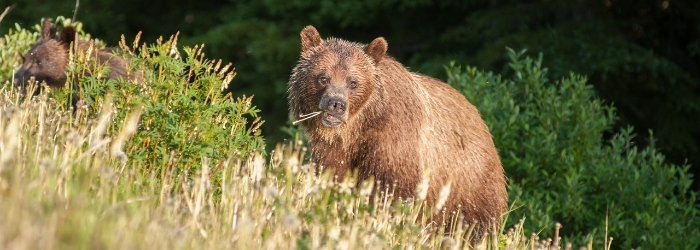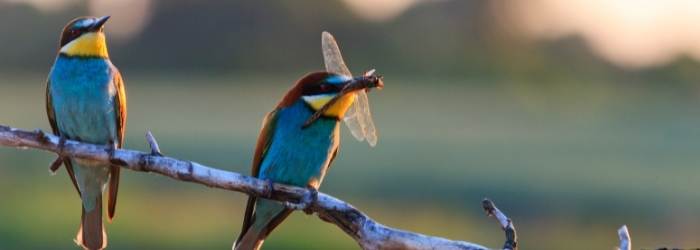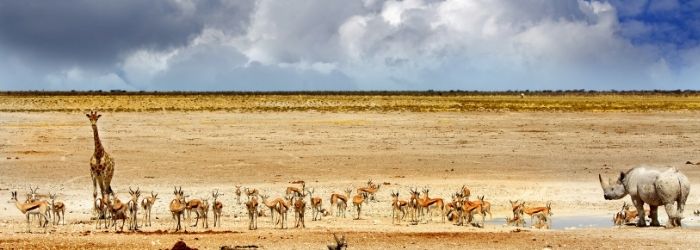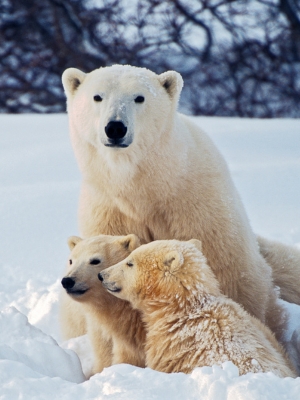Before COVID-19, world leaders and climate activists declared 2020 a “super year for nature” with vital international negotiations scheduled on the biodiversity and climate crises. As the pandemic spread, these negotiations were postponed to 2021, and we are now gearing up for a series of landmark meetings that, together, will set the international policy agenda on climate change and nature for decades to come. Born Free, a global leader in wildlife conservation and wild animal welfare, is working to make 2021 an exceptional year – a year of great ambition and opportunity to drive better outcomes for wild animals and people alike.
On October 20, 2020, Born Free launched its Global Nature Recovery Investment Initiative (GNRII), which provides a framework to halt and reverse biodiversity loss and wildlife overexploitation; deliver enhanced ecosystem viability and services alongside climate change mitigation; and promote public and animal health and welfare, sustainable livelihoods, and food and societal security.
As the world celebrates this International Day for Biodiversity, Born Free continues to forge ahead with its call for transformative reforms for the natural world.
“The prime objective of the GNRII is to make sure nature is heard, valued, recognized, prioritized, and loved as it should be. Through this initiative, we aim to amplify the knowledge and science that lays out how we need to change to ensure nature can recover fully. The priorities of our natural world must be what drives our economic growth and the decisions that global leaders will be making to tackle the recovery from COVID-19.” Said Will Travers, co-Founder and Executive President of Born Free Foundation in the UK, and President of Born Free USA.
This year, the theme of the International Day for Biodiversity celebration reminds us that “we are part of the solution.” Born Free is proud to have launched several initiatives to drive transformational change worldwide.
Explore Our Work
Calling on World Leaders to Implement Bold Commitments to Ensure Nature’s Recovery
Born Free was joined by 19 of the world’s leading conservation organizations (the WC20) in authoring a Declaration calling on world leaders to invest in nature to protect biodiversity, avoid future pandemics, and safeguard the long-term well-being and security of current and future generations and all life on Earth. This declaration was presented to the G20 summit in December 2020.
We are calling on world leaders to support the protection of at least 30% of land and sea areas worldwide by 2030 (30 by 30). This must include protecting at least 30% of the ocean from destructive industrial and non-industrial activities; the reduction of direct exploitation of threatened species to levels compatible with their recovery; the transformation of the valuation of nature in our global economic systems; and the mobilization of the resources necessary to secure its protection and recovery. This call was made in preparation for the One Planet Summit in January 2021, and in preparation for the upcoming 26th meeting of the Commonwealth Heads of Government Meeting.
Born Free USA joined 14 NGOs to call on the United States Fish and Wildlife Service to be more ambitious at the upcoming 19th meeting of the Conference of the Parties to the Convention on International Trade in Endangered Species (CITES) by seeking a complete prohibition of all commercial trade for species threatened with extinction that are or may be affected by international trade.
“Exploitation of wild plants and animals (which includes commercial trade) is the second leading driver of unprecedented decline in biodiversity, and in the case of marine species, it is the first driver. Traded species are more likely to be endangered than non-traded ones, and wildlife trade has the ability to annihilate affected species in just a few years. We must recognize our responsibility and ensure that our legal frameworks are strengthened to ensure species at risk of extinction will no longer be decimated by commercial trade.” Said Angela Grimes, Born Free USA’s Chief Executive Officer.
Promoting the Adoption of a Global Agreement on Wildlife Crime through the End Wildlife Crime Initiative
Born Free is founding member of the Global Initiative to End Wildlife Crime, which was established to promote the need for a new global agreement on wildlife crime, and for the amendment of existing international wildlife trade laws to include public and animal health criteria into decision-making. The Initiative has identified a protocol under the United National Convention against Transnational Organised Crime (UNTOC) as the appropriate vehicle for an international agreement, and has produced a draft protocol in collaboration with legal advisors.
At the opening session of the 13th Session of the UN Commission on Crime Prevention and Criminal Justice in Vienna on 17 May 2021, the Presidents of Costa Rica and Gabon confirmed they would launch the process for the establishment and implementation of a global agreement to tackle wildlife crime. The European Commission has confirmed its support for the initiative, as part of the EU Strategy to Tackle Organised Crime 2021-2025.
Securing Field Victories Against Wildlife Crime
In the field, Born Free USA organized 32 law enforcement training workshops for 18 countries in West and Central Africa, representing a total of 590 officials trained including customs officers, judges, prosecutors, rangers, airport employees, and other law enforcement officers. These trainings started paying off over the past year with participating officers successfully intercepting a wide variety of wildlife products including:
- 14 elephant tusks seized by Burkina Faso customs officers on 11 May 2021 in Ouagadougou;
- 400 kg (882 lbs) of pangolin scales seized by customs officers in the Northern part of Nigeria in March 2021;
- 2,400 lbs (8,800 kg) of pangolin scales; 2,772 elephant tusk pieces; 11 lbs (5 kg) of rhino horns; dried and fresh animal bones; 425 lbs (103 kg) of skulls suspected to be of lions and other wild cats; and 76 pieces of semi-processed and processed timber seized by the Nigeria customs in January 2021; and
- Significant shark fins seizures by customs authorities in Benin and in Ivory Coast.
Recognizing the True Value of Wild Animals through the REBALANCE EARTH Initiative
Rebalance Earth aims to internalize the cost of ecosystem protection into the economy of businesses, starting with the protection of keystone species such as forest elephants, whose daily activities increase the amount of carbon sequestered and stored in their forest habitat. Researchers at the International Monetary Fund estimates that, over its natural lifetime, a forest elephant’s activities can result in the sequestration of carbon to the value of at least US$1.75 million. Born Free is proud to support this initiative showcasing the need to translate what science is telling us about the value of the nature into the language of the markets and policy makers. To find out more, watch our Earth Day webinar.
Be Part of the Solution
1. Invest in Nature. Invest in Born Free. Support our efforts by making a donation to Born Free. Your gift – of any size – will help us fight to protect the natural world on a global scale, save animals, and protect habitats.
2. Watch and share our short film, Protect Them, Protect Us, which explains why, to protect humankind, we must protect the natural world and save wildlife from exploitation.
3. Contact your decision-makers to ask that they:
A. Actively support the adoption of worldwide commitments to expand protected areas to at least 30% of land and sea areas by 2030 and 50% by 2050 including by adhering to the High Ambition Coalition for Nature and People, the Global Ocean Alliance, and the Blue Leaders Campaign.
B. Actively support the adoption of targets and milestones in the post-2020 Global Biodiversity Framework ensuring that:
-
-
- Human-induced extinctions of wild species are halted;
- Declines of wild species are halted;
- Unnecessary wildlife trade both legal and illegal is eliminated;
- The recovery of species is secured to ensure that all wild species can maintain a favorable conservation status;
- The interrelationship between human health and well-being, animal health and welfare, and environmental health is fully recognized and prioritized through the adoption of the One Health and One Welfare approaches in the Framework.
-
C. Promote strong protection of oceans by:
-
-
- Ensuring that at least 30% of Oceans receive “high” protection status (no extractive activities allowed subject to the rights of indigenous communities) or “full” protection status (only light extractive allowed such as local community fishing) by 2030;
- Securing the conclusion of an international treaty under the UN Convention for the Law of the Sea for the conservation of marine biodiversity in areas beyond national jurisdiction;
- Securing firm commitments on pollution reduction.
-
D. Adhere to the End Wildlife Crime Initiative and actively support:
-
-
- The creation of a new global agreement on wildlife crime (UNOTC Wildlife Protocol).
- The amendment of existing CITES provisions to include public health and animal health into decision making.
-
E. Ensure that Convention on International Trade in Endangered Species of Wild Fauna and Flora (CITES) responds to the species extinction crisis more effectively by seeking to prevent commercial trade when a species is at risk of extinction.
F. Make a bold commitment to reduce carbon pollution during the COP26 UN climate change conference and commit to ambitious Nationally Determined Contribution of reducing climate-warming greenhouse gas emissions.
G. Promote recognition of the One Health and One Welfare frameworks, which recognize the links between animal health and welfare, human health and well-being, and broader environmental health; and support the incorporation of these principles into international policy initiatives and their implementation.



 Dear Reader,
Dear Reader,